2023 Weingut Nikolaihof Offer
An array of current & late release wines including:
The epic 1997 Vinothek Riesling in Magnum!
Riesling ~ Grüner Veltliner ~ Muskateller ~ Neubruger ~ Gewürtztraminer Chardonnay
***All wines are Super Dry with the exception of the Off-Dry Gutswein Riesling, Auslese & Trockenbeerenauslese***
Wines will arrive Mid-2024
THERE WILL BE ONLY ONE SHIPMENT THIS YEAR
THE IMPORTER WILL ONLY SHIP WINES THAT HAVE BEEN PRE-SOLD
LAST CHANCE
All requests are subject to allocation.
Invoicing will be upon confirmation.
If you’ve not tried Nikolaihof’s wines I recommend grabbing a:
2016 NIKOLAIHOF RIESLING FEDERSPIEL LATE RELEASE from $105ea
+
2022 NIKOLAIHOF GRÜNER VELTLINER FEDERSPIEL from $79ea
or
2017 NIKOLAIHOF GRÜNER VELTLINER FEDERSPIEL LATE RELEASE MAGNUM
from $234
Prologue
The love of wine yields pain and pleasure. The further down the rabbit hole you venture the harder it becomes to find wines that are exhilarating.
The very top end of Nikolaihof’s wines achieve this feat.
I kept hearing about Nikolaihof yet somehow never managed to try any of their wines.
I managed to wangle a few bottles from Tim’s reserve to do some QA and get my eye in before compiling this offer. It took around 30 seconds of looking at these to push the go button.
- 2021 Muskateller
- 2016 Riesling Fiederspiel Late Release
- 2013 Baumpesse Grüner Veltliner Im Weingebirge
Today’s offer includes the 1997 Vinothek Riesling that spent 25 years in 3,500L foudre before release. Its predecessor was the first Austrian wine to be awarded a perfect 💯!
I guess when you can trace your history back to 63BC extended maturation in Foudre for 25 years is just a blip in time.
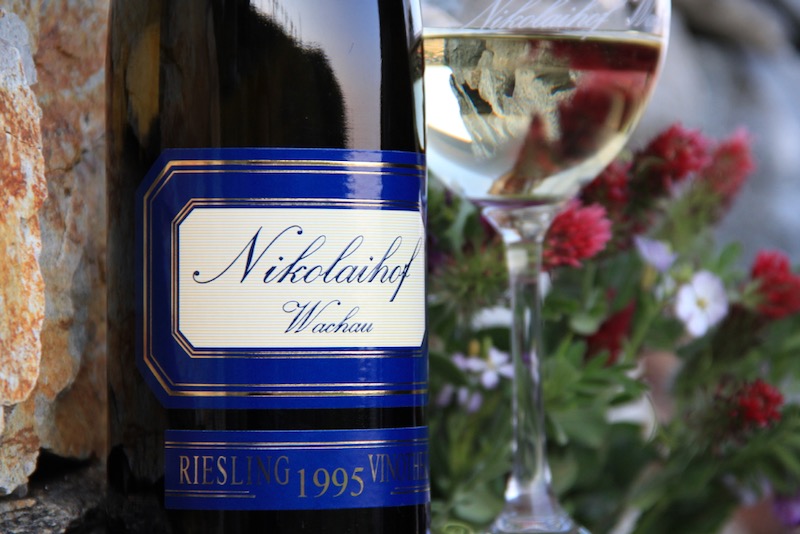
These are remarkable wines!
In the ‘Wine Decoded Tasting Revolution’ available free to members, I explore the key elements of exceptional wine.
There are two criteria specifically that take Nikolaihof’s extended maturation & Vinothek wines to the upper echelons.
First development and freshness
The overwhelming majority of wines are released within 1-3 years and the job of achieving peak maturity is left to the consumer.
Nikolaihof’s wines see significant time in foudre, 5-25 years.
During that time, Nikolaihof give their wines the care a mother would their children. By the time they are released to us we’re devouring a mature and wise child, these nectars retain the energy and vitality to have you walking away refreshed.
Second, overall beauty, style or personality if you wish
It is a rare beast that completely entrances with sheer beauty, balanced with a naughty edge so carefully placed that it doesn’t detract from the intoxicating nature of a wine. To be wise to the world and present itself as humble, gracious, and complete, surpassing the highest of expectations is the holy grail.
Nikolaif’s vineyards proffer ripe fruit, at alcohol levels on the low end of the spectrum. This might sound like a technicality, the impact in the glass is significant. It’s only possible to pick ripe fruit at this alcohol when you have old, balanced vines that have seen attention to detail not just across a year but across decades.
Such intensity is typically seen at much higher alcohol in Austria. Achieving flavour and phenolic ripeness at lower alcohol levels has the benefit of giving a wine greater natural acidity, freshness, energy, and a weightlessness, feather-light feel not otherwise possible. I saw this time and time again making the wine at Yarra Yering. Our vintage would be finished before many were even halfway through picking!
Nikolaihof’s wines start at a high base & step up to the plate at each price point!
You can explore the entire range below with confidence.
About Weingut Nikolaihof
On the eastern edge of the Wachau valley, there lies Nikolaihof, in the quiet village of Mautern.
In its current manifestation, Nikolaihof is a wine estate, yet it has lived many lives. The wines of the house are a singular experience: the combination of unique Wachau terroirs with ancestral technique blends together in this place to form something at once ancient, yet novel in the contemporary wine world. Decisions here are not dictated by the market or trends.
Nikolaus Saahs (Jnr) runs the Nikolaihof estate on strict biodynamic principles and it is possibly Europe’s first ever biodynamic winery with the practices being used since 1971 (before Nicolas Joly even!). They were certified in the early 1990s.
Away from the vini/viticulture side of things, they also practice what they preach, running their estate as a small bio-farm; growing and making all manner of produce to serve alongside local fare in their weinstub, as well as serving produce from other local likeminded producers.
Nikolaihof is a realm dense with historical memory. These memories and a winemaking ethos built upon tradition provide the backbone for many of the hallmarks of Nikolaihof. Wines are released when they are ready not necessarily when the market wants them. Fermentation and elevage are never rushed or hurried. Harvests are unique in the vineyards of Nikolaihof. Due to the strict use of biodynamic preparations and vineyard management, the estate is often able to achieve grape ripeness well before their more conventional-farming neighbors. The rhythms and cycles of Nikolaihof are all their own. They are continuing traditions and living in a history with deeper roots than almost any estate in Europe.
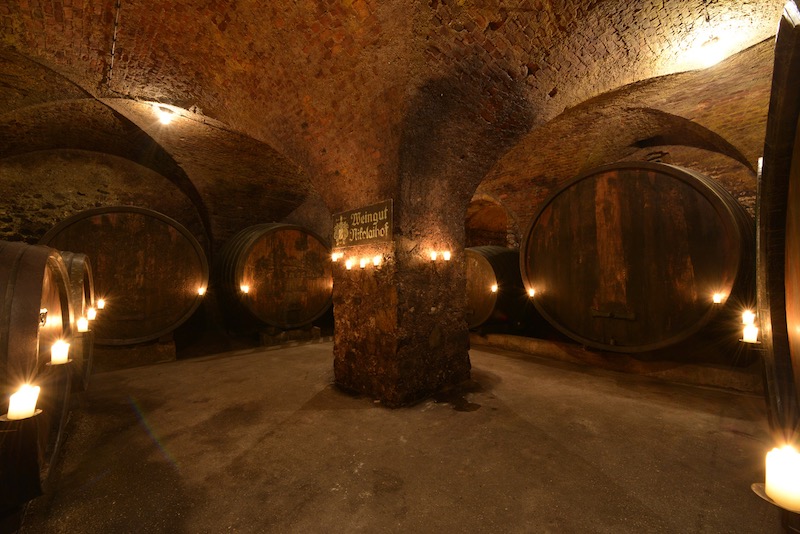
Nikolaihof is the oldest wine estate in Austria, for over two millennia, the grounds of Nikolaihof have been revered for both vinous pursuits and the mystical. Nikolaus Saahs, the current owner and winemaker at Nikolaihof, took over production from his parents in 2005. At the helm of this famed house, he keeps the long view in mind. Which course this makes sense when one considers the scale of history the estate encompasses. The Nikolaihof monastery was founded in 985 AD by the diocese of Passau. Its specific location was chosen to capitalize on pre-existing Celtic mystical reverence for the site dating back to the Roman era as well as the prestigious vineyards nearby. The wines of Nikolaihof are still barrel-aged in the ancient cellar built by the Romans in the 63BC. The current buildings stand on the original foundations and the barrel cellar itself is constructed in the Roman crypt. It’s incredible!
Winemaking on the site can be traced back to the Celts, with the first documented reference to wine from 470 AD.
Nikolaus’ mother, Christine, was a student of Rudolph Steiner’s School of Anthroposophy after being acquainted with his teaching in medical school. Christine became an important advocate for biodynamic agriculture in Austria and Europe. Nikolaihof was one of the first biodynamic wineries in Europe in 1971. The results speak for themselves: year to year Nicholas is able to harvest ripe, healthy grapes even in years where others may struggle. And yet the wines of Nikolaihof show remarkable balance. The category of “Smaragd” designates the ripest, high-alcohol wines of the valley with at least 12.5% ABV. Sometimes this leads to over-blown or flabby wines. Yet Nikolaihof’s Smaragd wines always fall closer to the 12.5% line representing elegant, balanced examples of the category.
“Organic, biodynamic winery whose wines express the earth, the whole earth and nothing but the earth. Nikolaihof’s wines are often incredibly thick, dense and uncompromisingly stony in character… JUST GIVE THESE WINES TIME. They’ll do everything for you that great wine can do, if you are patient. Early on you’ll easily see their sheer intensity, but specific details can be lost in a monolith of concentration, an opacity that can be perplexing if you don’t know what’s ahead. Thus detailed tasting notes are difficult if you feel the need to delineate skeins of flavors with sequences of associations. Here you just stand on the prow and feel the wind and look at the swollen waves of vinosity and hope you aren’t swept overboard. And hope you are. . . .”
Michael Skurnik
“A remarkable shelf life is a general feature of the wines of Nikolaihof, which tend to develop very slowly – what factors are responsible for the degree, we can only guess: an essential part of the reason is the decades of biodynamic management according to Nikolaus Saahs. However, you can also attribute it to the slow fermentation with natural yeasts and the customary maceration times, and also the fact that, while in principle the work is reductive, the maturation in large old oak barrels takes place in the perfect cellar environment. The shelf-life of the wines does not rely on the alcohol because even in the hot, ripe years the Smaragds do not significantly exceed 13 percent.”
Vinaria
In the Vineyard
Nikolaihof’s holdings are some of the farthest east in the Wachau near the village of Mautern on the Danube’s south bank. In fact one of Nikolaihof’s most ethereal wines is sourced from Steiner Hund, a vineyard just across the border in the Kremstal. These are also some of the oldest known vineyards in Europe with sites such as “im Weingebirge” being mentioned as far back as 470AD. Whether it’s Nikolaus biodynamic know-how, his focus on ancestral vinification techniques, or the quality of his terroir, the resulting wines are wildly unique and joyful.
Today the vineyard area totals 22 hectares, predominantly in the Wachau with a small area in neighbouring Kremstal. The soils are decomposed granite, gneiss and mica. Many of the sites across the domaine have old vines with the average age of over 50 years.
Nikolaihof has maintained a regime of biodynamic intervention and cultivation for over 40 years. Under Nikolaus this tradition continues. No pesticides or herbicides are used in their vineyards instead stinging nettles, manure, valerian tea and other traditional biodynamic preparations make up Nikolaihof’s inventory for pest management and overall vineyard health.
Top Sites
Im Weingebirge: The oldest named vineyard site in Europe, the soil is varied with loess on the higher terraces and deep topsoil over primary rock lower down the slope
Vom Stein: Vom Stein is a sub-site of the Silberbichel vineyard. The soils are gneiss with mica inclusions; there is a layer of loess and topsoil
Steiner Hund: Primary rock with river pebbles, very stony, just outside of the Wachau borders hence the labeling of “Reserve” and not Smaragd
Soil Types: Primary rock topped with humus or gravel, and eroded primary rock
Grape Varieties: 55% Riesling, 35% Grüner Veltliner, 10% Weissburgunder, Malvasier, Neuburger, and Chardonnay
In the Winery
Fermentations at Nikolaihof are long, slow, and spontaneous. Elevage happens in large, 40-year-old barrels or stainless steel with full lees contact until the wines are bottled. These bottlings could be many years from harvest. The Vinothek Riesling Severin Fass matures for 25 years in large oak barrels before bottling! Consider Nikolaihof’s lauded 1995 Vinothek Riesling: the first Austrian white wine to receive 100 points from Wine Advocate, it was bottled 17 years after harvest and released to the market in 2012. This wine sold out upon release but the 1997 Vinothek is available now and has received its share of acclaim (Advocate & Vinous Media both gave it 97 points.)
The result is some of the greatest white wines I have been privileged to taste. Delicate with strong mineral accents and deep concentration, their low alcohol and crystalline purity is the antithesis of the late picked, high extract styles that are famous from the Wachau. These are wines with incredible energy that will demand your time.
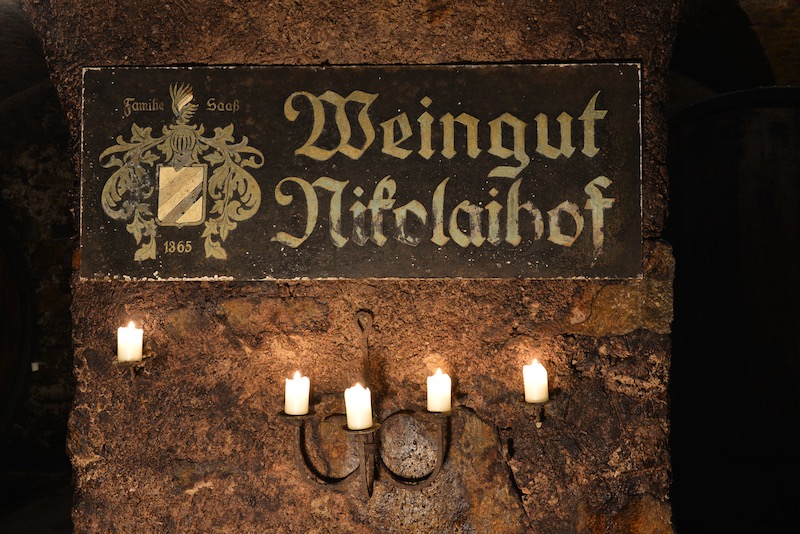
The Baumpresse ~ Basket Press
Used to make one wine each year. The pressing process takes 10 hours a significant time during which skin contact occurs releasing flavour and textural, phenolic compounds into the juice.
The Wachau Classification
The Steinfeder, Federspiel and Smaragd classifications are inseparably linked to the wines of the Wachau. The wines are always dry, made without any noticeable wood influence, while any form of sugar addition is not permitted. The categories are defined according to the level of maturity of the grapes.
Nikolaihof whilst using the classification makes many wines that although labeled within one classification sit above that classification in terms of real quality and pleasure in the glass. Nikolaihof achieves phenological, flavour and tannin, ripeness and sugar levels lower than many in the Wachau. The fruit is ripe, yet it is achieved at lower alcohol and with higher natural acidity than many other producers. This might sound like a technicality, the impact in the glass is significant. It’s only possible to pick ripe fruit at this alcohol when you have old, balanced vines that have seen attention to detail not just across a year but across decades. Such intensity is typically seen at much higher alcohol in Austria. Achieving flavour and phenolic ripeness at lower alcohol levels has the benefit of giving a wine freshness, energy, and a weightlessness, feather light feel not otherwise possible. I saw this time and time again making the wine at Yarra Yering. Our vintage would be finished before many were even halfway through picking!
STEINFEDER ®
The “Steinfeder” is an indigenous feather grass from the Wachau and the name for the lightest of the three Wachau wine categories. It was the first trademark introduced by Vinea Wachau in 1984. The maximum alcohol content is 11.5 % by volume. The style is lively and delicate, with refreshing fruit in the foreground.
FEDERSPIEL®
A “Federspiel” is a prey dummy used as a lure in falconry, a sport once popular in the Wachau. These wines have between 11.5% and 12.5% alcohol, which puts them at the golden mean of the Wachau’s stylistic spectrum. These wines are often labelled with their vineyard of origin. Federspiels combine vitality and character and their delicate aroma components make them ideal food matches.
SMARAGD ®
The Wachau vineyard terraces and their dry stone walls offer a natural habitat for numerous plants and animals; among them the local green “Smaragd” lizard that lends its name to the best known of the Vinea categories. The grapes for the Smaragd wines, which must have a minimum of 12.5% alcohol by volume, ripen in the best vineyard sites of the Wachau. They are harvested late and are true representatives of their terroir. The wines are concentrated and powerful, complex and very long-lived.
I can’t recall the connection between this lizard and the Smaragd classification. You’ll see it on some labels. The pic of this scaly friend was taken in Nikolaihof’s vineyards.
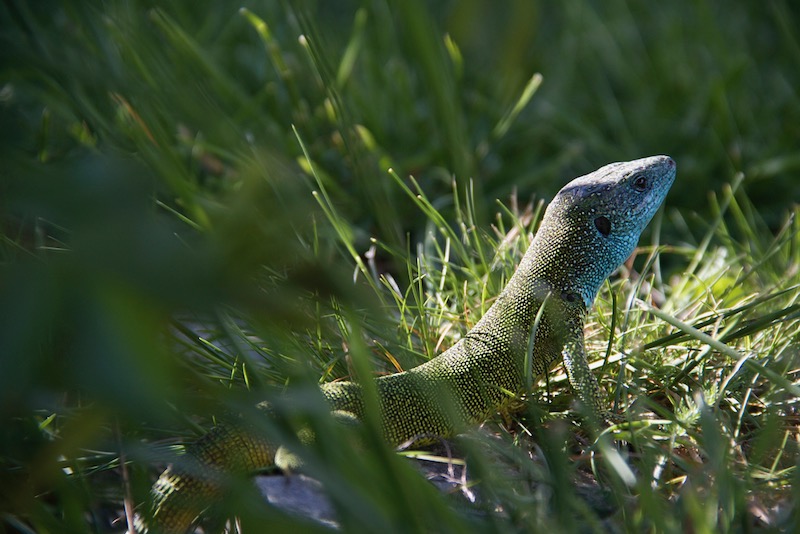
Where in the World is Nikolaihof?
Weingut Nikolaihof is based in the eastern extremes of the Wachau Valley with additional holdings just across the border in Kremstal.
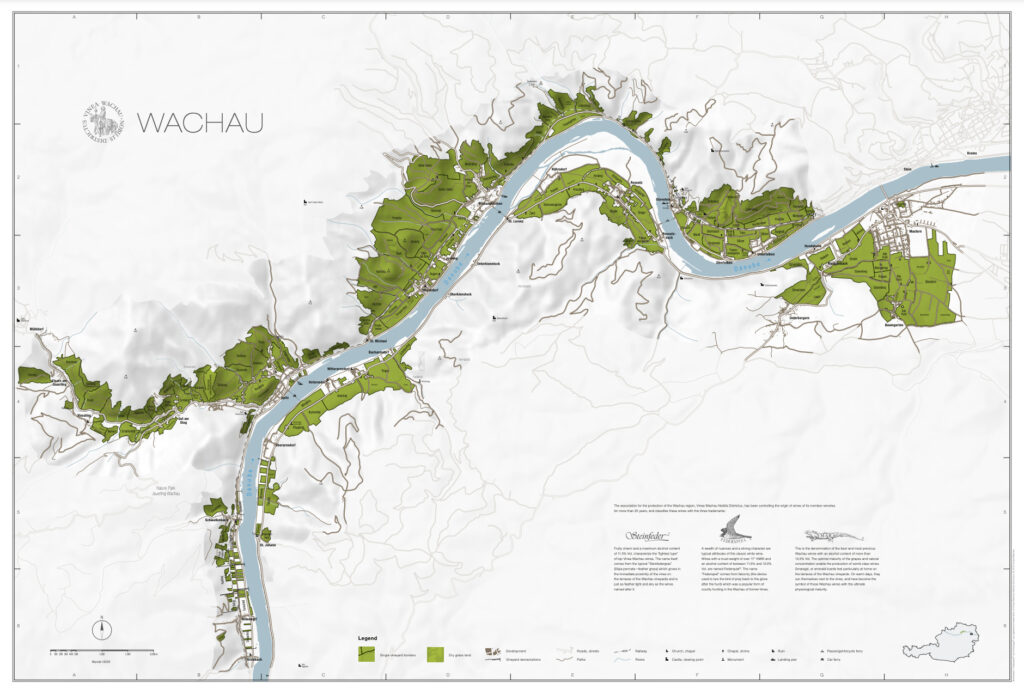
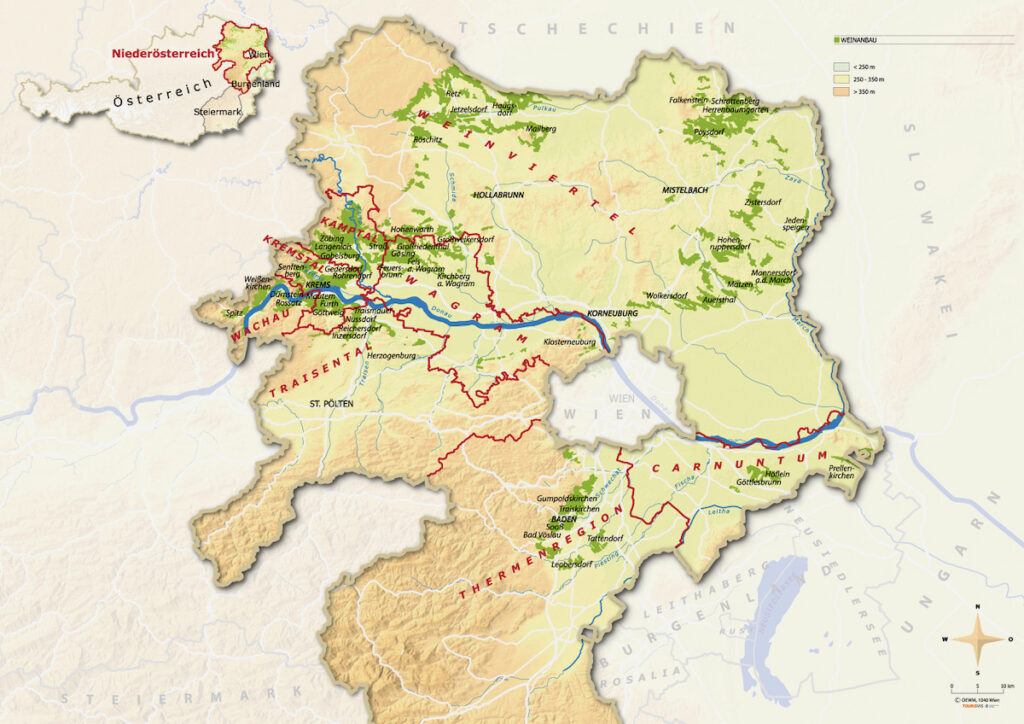
About the Wines
THE WHITE VARIETALS
2022 NIKOLAIHOF NEUBURGER

Neuburger is a traditional but little-known Austrian grape. You can also find it in the Czech Republic, Slovakia and in Romania
Variety: 100% Neuburger (Roter Veltliner x Silvaner)
Region: Wachau
Vineyard: From 14-year-old vines in the Im Weingebirge and the Silberbichl Bischofpoint.
Soil Type: Loess soil on Danube gravel
Fermentation & Élevage: Selective manual harvest. The wine is fermented on natural yeast without the addition of sugars, enzymes or flavor enhancers. Matured for 6 months in old oak barrels
Taste: This Neuburger has a full and soft taste and has a seductive scent of blooming flower meadows in summer
Alcohol: 12.5%
Acidity: 4.9 grams per liter
Residual sugar: 2.4 grams per liter
**REVIEW OF THE 2020** The 2020 Wachau Neuburger is initially much more on the Chardonnay side than it reminds me of the Wachau, particularly if served next to the Gelber Muskateller like in my case. It takes a while to pick up the aromatic, well-concentrated and spicy (stone) fruit aromas, but they come and make up for a stunning Neuburger. Crystalline and finessed on the palate, this is a pure, precise and textural white with a long and serious finish. Excellent and another long-distance runner. 12% alcohol. Tasted at the domaine in June 2021.
2022 NIKOLAIHOF GELBER MUSKATELLER
My note on the 2021 Muskateller 11.5% Screwcap
Carrying a little CO2 making for a lively palate when combined with plentiful fine acid. Muscat shining on the nose with all of those floral and fragrant terpenes. They can be overbearing in some wines, not so here, they sit in balance and harmony with citrus ad spice. A salty mineral pleasantly sour hit, on again, a beautifully weighted palate. As the CO2 blows off the expression builds. A Playful, fun and delicious dry Muskateller.
Variety: 100% Gelber Muskateller AKA Muscat à Petits Grains Blanc
Region: Wachau
Vineyard: Own vineyards.
Soil Type: Loess soil on Danube gravel
Fermentation & Élevage: The grapes undergo spontaneous fermentation in large tanks (2000 to 12000 liters) where they remain for approximately 6 months to ripen. Spontaneous fermentation on large tanks (2000 to 12000 litres) where they mature for approximately 6 months
Taste: Delicate, fruity and juicy summer wine. Aromatic and floral with beautiful acidity in the long finish.
Alcohol: 11.5%
Acidity: 7.3 grams per liter
Residual sugar: 1.2 grams per liter
2019 NIKOLAIHOF GEWÜRZTRAMINER

Variety: 100% Gewürztraminer
Region: Wachau
Vineyard: Own vineyards.
Soil Type: Loess soil on Danube gravel
Alcohol: 12.5%
Acidity: 5.7 grams per liter
Residual sugar: 6.6 grams per liter
2019 NIKOLAIHOF CHARDONNAY
Variety: 100% Chardonnay
Region: Wachau
Vineyard: Own vineyards.
Soil Type: Loess soil on Danube gravel
Alcohol: 13.5%
Acidity: 6.2 grams per liter
Residual sugar: 6 grams per liter
THE RIESLINGS
2017 NIKOLAIHOF GUTSWEIN RIESLING

This became the Nikolaihof “manor” wine after a natural fermentation stop. Bright and intense on the nose, with aromas of minerality, wet forest floor, sweet peach, white flowers, and a hint of dry bread and honey. It fits perfectly with Asian and spicy dishes due to its light sweetness.
Variety: 100% Riesling
Region: Wachau
Vineyard: Own vineyards.
Soil Type: Loess soil on Danube gravel
Fermentation & Élevage: Harvested manually. This is part of the ‘Vom Stein’ Riesling Federspiel, which was used as ‘gutswein’ after the natural cessation of fermentation. 6 months maturation and bottled in April 2018. Spontaneous fermentation on large foulers (2000 to 12000 liters)
Taste: Clear and intense on the nose, with aromas of minerality, forest floor, sweet peach, white flowers and a hint of dry bread and honey with a slightly sweet aftertaste.
Alcohol: 13.5%
Acidity: 6.2 grams per liter
Residual sugar: 12.1 grams per liter
2022 NIKOLAIHOF RIESLING FEDERSPIEL
Nikolaihof’s Fiederspiel level the middle ripeness of the classifications.
Vom Stein: This site is a sub-site of the larger Silberbichel vineyard. Located south east of the village, this is just 5.25 Ha and is a slight incline, sloping east, on the easternmost border of the Silberbichel vineyard. The soils are gneiss with mica inclusions; there is a layer of loess and topsoil here – 60-120cm before you start to hit primary rock. Nikolaihof is the only winery to bottle this site on it’s own, but it is not a true monopole.
Variety: Riesling
Region: Wachau
Vineyard: Vom Stein
Soil Type: Gneiss, mica inclusions, and loess
Fermentation & Élevage: Large, old casks
2016 NIKOLAIHOF RIESLING FEDERSPIEL LATE RELEASE
Superb dry Riesling of harmony and clarity, a charming transparency, graceful, pure and flowing, perfectly weighted with long even length and depth.
White flowers, earthy, savoury, lanolin & shroom funk, a little spice. Fine luscious mouthfeel with incredible restraint, sophisticated yet powerful. Underlying ripe, fresh citrus of energy. Such grace with a sensual texture. Beautifully developed yet full of energy. Blossoming in the glass. This wine speaks to me!
Nikolaihof’s Fiederspiel level the middle ripeness of the classifications.
Vom Stein: This site is a sub-site of the larger Silberbichel vineyard. Located south east of the village, this is just 5.25 Ha and is a slight incline, sloping east, on the easternmost border of the Silberbichel vineyard. The soils are gneiss with mica inclusions; there is a layer of loess and topsoil here – 60-120cm before you start to hit primary rock. Nikolaihof is the only winery to bottle this site on it’s own, but it is not a true monopole.
Variety: Riesling
Region: Wachau
Vineyard: Vom Stein
Soil Type: Gneiss, mica inclusions, and loess
Fermentation & Élevage: Manual harvest in 2016. Careful pressing followed by fermentation on natural yeast. Subsequently matured for 6 years in large wooden barrels. Wood education
6 years maturation on large wooden tanks (2000 to 12000 liters)
Alcohol: 12.0%
Acidity: 8.4 grams per liter
Residual sugar: <2.0 grams per liter
2019 NIKOLAIHOF RIED VOM STEIN RIESLING SMARAGD

Nikolaihof’s Smaragd level the ripest of the classifications.
Vom Stein: This site is a sub-site of the larger Silberbichel vineyard. Located south east of the village, this is just 5.25 Ha and is a slight incline, sloping east, on the easternmost border of the Silberbichel vineyard. The soils are gneiss with mica inclusions; there is a layer of loess and topsoil here – 60-120cm before you start to hit primary rock. Nikolaihof is the only winery to bottle this site on it’s own, but it is not a true monopole.
Variety: Riesling
Region: Wachau
Vineyard: Vom Stein
Soil Type: Gneiss, mica inclusions, and loess
Fermentation & Élevage: 4 1/2 years in large, old casks
Alcohol: 13%
Acidity: 6.4 grams per liter
Residual sugar: 3.8 grams per liter
**REVIEW OF THE 2017** The Mautern 2017 Riesling Ried Vom Stein Smaragd offers a pure, refined and finely oxidative bouquet of bright, ripe fruits intermingled with smoky and saline terroir notes as well as some delicate oak. Round and intense on the palate, with fine, playful and persistently saline acidity, this is a full-bodied, dense and very elegant Riesling with striking intensity and finesse. 12.5% stated alcohol. Natural cork. Tasted in October 2022.
2016 NIKOLAIHOF KLAUSE RIESLING
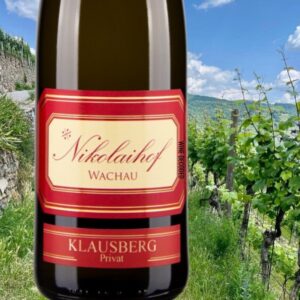
From just across the border in Kremstal. Named after an old hermitage, the small, terraced vineyard is located high above the north bank of the Danube. A mineral Riesling from a soils of hard primary rock covered with a thin layer of topsoil.
Decanting recommended.
Grape: Riesling
Region: Kremstal
Fermentation & Élevage: 4 years in big old oak casks
Alcohol: 12.5%
Acidity: 6.0 grams per liter
Residual sugar: 5.5 grams per liter
**REVIEW OF THE 2014** Previously called Klause am Berg Privat, the Kremstal 2014 Riesling Klause is beautifully intense, clear and aromatic on the concentrated and immediately seductive nose. Crystalline, refined and highly elegant on the palate, this is a medium to full-bodied, lush and salty Riesling with crystalline acidity and very fine tannins. Stewed fruit aromas populate the finish and result in perfect roundness. 12.5% alcohol. Tasted at the domaine in June 2021. Drink 2021-2045
2017 NIKOLAIHOF RIED STEINER HUND RIESLING

Under a thin layer of humus, the vine roots dig deep in the hard, primary rock and bring forth extremely balanced wines with pronounced mineral character and refined elegance.
Grape: Riesling
Region: Kremstal
Vineyard: Steiner Hund with a soil of Gneiss and a thin layer of humus
Fermentation & Élevage: Harvested manually. The grapes undergo spontaneous fermentation in large tanks (2000 to 12000 liters) where they remain for approximately 2.5 years to mature.
Taste: Seductive aroma of apricot, peach, rose and light spiciness. Elegant lively fruity, off-dry taste with ripe acidity, broad flavor structure. The aftertaste continues for a long time.
Alcohol: 12.5%
Acidity: 6.6 grams per liter
Residual sugar: 4.0 grams per liter
**REVIEW OF THE 2016** With cacao and crushed stone as well as concentrated peach aromas, the 2016 Ried Steiner Hund Riesling is subtle, refined and complex on the finely spicy yet deep, complex and elegant nose. Bottled in April this year, this is a full-bodied, dense, juicy, well-concentrated and crystalline-mineral Riesling with lots of power and sustainable grip and concentration. Another long-distance runner yet more puristic and grippy than the 2015 or 2013. 12.5% alcohol. Tasted at the domaine in June 2021. Drink 2021-2045
Another stunning Steiner Hund dry riesling from Nikolaihof! Deep and complex nose with a ton of flint, but also crushed-rock, quince and pomelo aromas. For the very warm vintage this is astonishingly cool and restrained, with beautiful wet-stone minerality intertwined with the elegant acidity. Very long, silky finish. From biodynamically grown grapes with Demeter certification. Drink or hold.
2015 Nikolaihof Baumpresse Riesling
The gentle giant presses the grapes for over ten hours, which then mature into wines of exceptional character. Please decant.
Grape: 100% Riesling
Region: Wachau
Vineyard: Loam, loess, paragneiss rock
Fermentation & Élevage: 5½ years in a 2,000L casks.
Alcohol: 12.5%
Acidity: 6 grams per liter
Residual sugar: 5.6 grams per liter
A baumepress is a traditional Austrian basket press.
1997 NIKOLAIHOF VINOTHEK SEVERIN FASS RIESLING MAGNUM
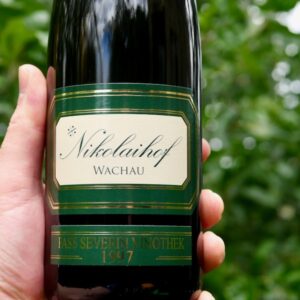
Given the reputation of the predecessor to this wine, the 1995 and the Nikolaihof wines I’ve tasted to date, I have no doubt this wine is exceptional! Magnums are coming via a pre-arrival offer.
The name ‘Fass Severin’ refers to the Barrel ‘Fass’ and its name Severin in which the wine was aged.
Aged for 25 years in 3,5000 liter old casks.
The 1997 Riesling Vinothek Severin Fass was aged for 25 years in a large, traditional oak cask (filtered, though not on the lees) and opens with an intense yet pure, fresh and spicy, finely oaky bouquet with a deep, mineral tone of crushed stones. On the palate, this is a very intense and complex Riesling slowly building up and revealing great finesse and balanced juiciness. The wine develops a sustainable, aromatic and structured finish with great finesse, lingering salinity and fine tannin grip. A fabulous, intense and elegant Riesling that is incredibly young in terms of freshness but ageless and immortal by its structure and fruit intensity. Natural cork. Tasted in June 2022. Drink 2022-2050
Welcome to the wine time machine! Although there are deep, mature aromas that range from an old library to quince paste and beeswax, after a little aeration some remarkably fresh citrus character emerges. Great concentration and restrained power on the wonderfully harmonious palate. Very long, bone-dry finish. Bottled in early 2022 after 25 years maturing in a large barrel of neutral oak. The barrel name, Fass Severin, is on the label. From biodynamically grown grapes with Demeter certification.
SWEET RIESLINGS
2017 Nikolaihof Ried Steiner Gaisberg Riesling Auslese
In 2017 a very rare Riesling Auslese could be vinified. The grapes for this sweet wine originate from ‘Ried Altenburg’ from the terraces of Stein
Grape: Riesling
Region: Kremstal
Vineyard: ‘Ried Altenburg’ from the terraces of Stein
Fermentation & Élevage: 6 months in big old casks..
Taste: Seductive aroma of apricot, peach, rose and light spiciness. Elegant lively fruity, off-dry taste with ripe acidity, broad flavor structure. The aftertaste continues for a long time.
Alcohol: 12%
Acidity: 5 grams per liter
Residual sugar: 33 grams per liter
2014 NIKOLAIHOF NIKOLAUSWEIN TROCKENBEERENAUSLESE 375ml
A filigreed aromatic, harmonious Trockenbeerenauslese.
Grape: 70% Riesling, 20% Grüner Veltliner and 10% other botrytised grapes.
Region: Wachau
Vineyard: Various Nikolaihof Vineyards.
Fermentation & Élevage: 5 years in small oak casks. Bottles in April 2020.
Alcohol: 10%
Acidity: 9 grams per liter
Residual sugar: 230 grams per liter
GRÜNER VELTLINERS
2022 NIKOLAIHOF GRÜNER VELTLINER HEFEABZUG
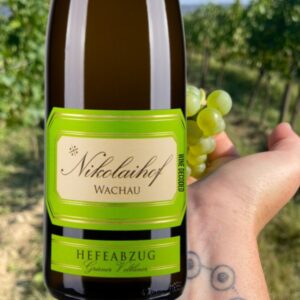
Sourced from many different vineyards near Mautern, the Grüner Veltliner Hefeabzug is Nikolaus Saahs’ “Steinfeder” class.
Named after the aging process on light lees. The lightest Grüner Veltliner is a perfect aperitif wine. Fresh and expressive.
Variety: Grüner Veltliner
Region: Wachau
Vineyard: Old vineyard with a clay, loess and paragneiss-rich soil
Fermentation & Élevage: It undergoes a long, slow fermentation in stainless steel followed by 6 months maturation in tank on fine lees.
Alcohol: 11.5%
Acidity: 5.4 grams per liter
Residual sugar: 2.5 grams per liter
**REVIEW OF THE 2020** The 2020 Grüner Veltliner Hefeabzug is very clear and bright in color and flavors, with refreshing lime and lemon zest aromas, great precision, definition and finesse. Quite substantial on the palate, this is a textural, intense, refreshing and remarkably persistent Veltliner with serious grip and a stimulating citric bitter note on the finish.
2022 NIKOLAIHOF GRÜNER VELTLINER FEDERSPIEL
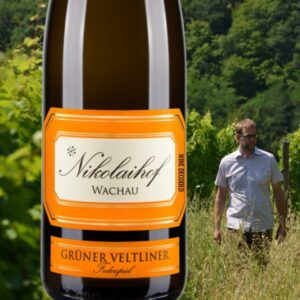
Thought to be the oldest documented vineyard, the name “Im Weingebirge”, Wine Mountains, dates back to the 5th Century. The wines from this vineyard are known to have impressive depth and minerality. The soil is varied with loess on the higher terraces and deep topsoil over primary rock lower down the slope. The wine ages on its lees in old barrels, giving it a creamy texture to match the fruit and Grüner spice.
Variety: Grüner Veltliner
Region: Wachau
Vineyard: Old vineyard with a clay, loess and paragneiss-rich soil
Fermentation & Élevage: Harvested manually. The grapes undergo spontaneous fermentation followed 6 months aging in big oak casks.
Alcohol: 11.5%
Acidity: 5.6 grams per liter
Residual sugar: 5.4 grams per liter
**REVIEW OF THE 2020** Previously called Im Weingebirge, the 2020 Grüner Veltliner Federspiel comes along without single-vineyard designation and opens intense and aromatic on the nose that is deep, precise and focused and reveals perfectly ripe and intense fruit. Round and lush on the palate, this is a mouth-filling, salty-piquant and mineral structured Federspiel with substance, grip and a sustainable finish. 12% alcohol. Tasted at the domaine in June 2021.
2017 NIKOLAIHOF GRÜNER VELTLINER FEDERSPIEL LATE RELEASE MAGNUM
Variety: Grüner Veltliner
Region: Wachau
Vineyard: Old vineyard with a clay, loess and paragneiss-rich soil
Fermentation & Élevage: Harvested manually. The grapes undergo spontaneous fermentation.
Taste: An elegant Grüner Veltliner. Delicate pepper, almond and ripe fruit in the scent. The taste has slightly tingling acidity, slightly spicy and fresh ripe fruit
Alcohol: 12.5%
Acidity: 5.9 grams per liter
Residual sugar: 1.0 grams per liter
From one of the oldest vineyard designations in Europe (first mentioned in 511 AD) and grown on clay, loess and paragneiss soils, the 2017 Im Weingebirge Grüner Veltliner Federspiel displays a clear and subtle bouquet of white fruits, almonds, cinnamon, stewed apples and a dash of fresh lemon juice. Very elegant and beautifully balanced on the palate, this is a dense, well-structured and persistent Veltliner with a fine, crystalline acidity and a long and intense finish. It was bottled at the end of April and tasted in early September 2018. Drink 2020-2033
2018 NIKOLAIHOF RIED IM WEINGEBIRGE GRÜNER VELTLINER SMARAGD

This wine is from the ripest Smaragd classification.
Thought to be the oldest documented vineyard, the name “Im Weingebirge”, Wine Mountains, dates back to the 5th Century. The wines from this vineyard are known to have impressive depth and minerality. The soil is varied with loess on the higher terraces and deep topsoil over primary rock lower down the slope. The wine ages on its lees in old barrels, giving it a creamy texture.
Variety: Grüner Veltliner
Region: Wachau
Vineyard: Im Weingebirge
Soil Type: Clay, loess, and paragneiss
Fermentation & Élevage: 3½ year in large, old casks
Alcohol: 13%
Acidity: 5.2 grams per liter
Residual sugar: 2.2 grams per liter
**REVIEW OF THE 2017** The Demeter-certified 2017 Grüner Veltliner Ried Im Weingebirge Smaragd from Mautern is delicate yet intense on the pure, refined and elegant nose that shows ripe fruit intertwined with earthy notes. Round, refined and lush on the palate, with delicate but firm mineral acidity, this is a full-bodied and sustainably structured Veltliner with an intense, warming but elegant, finely grippy, saline and tensioned finish. 13% stated alcohol. Natural cork. Tasted in October 2022. Drink 2022-2040
A stunning version, showing incredible complexity combined with elegance, this offers an intense mix of ginger, tangerine and peach flavors that are powerful and backed up by juicy acidity. The finish offers notes of jasmine, cream and spice.
2012 NIKOLAIHOF GRÜNER VELTLINER STEINTERRASSEN MAGNUM
Variety: Grüner Veltliner
Region: Wachau
Vineyard: Terraced, old vineyard with a clay, loess and paragneiss-rich soil
Fermentation & Élevage: Manual harvest in 2012. Careful pressing followed by fermentation on the lees. Subsequently aged for 11 years in large wooden barrels and bottling in September 2023. 11 years maturation in large old casks (2000 to 12000 liters)
Taste: Light golden yellow with green reflections, fruity but also mainly spiciness and spices. The wine is very aromatic, deep, slightly spicy and has some nice earthy notes. Silky soft, nice acidity and a long finish with some waxy notes that the long ripening phase brings.
Alcohol: 12.0%
Acidity: 6.2 grams per liter
Residual sugar: <2.0 grams per liter
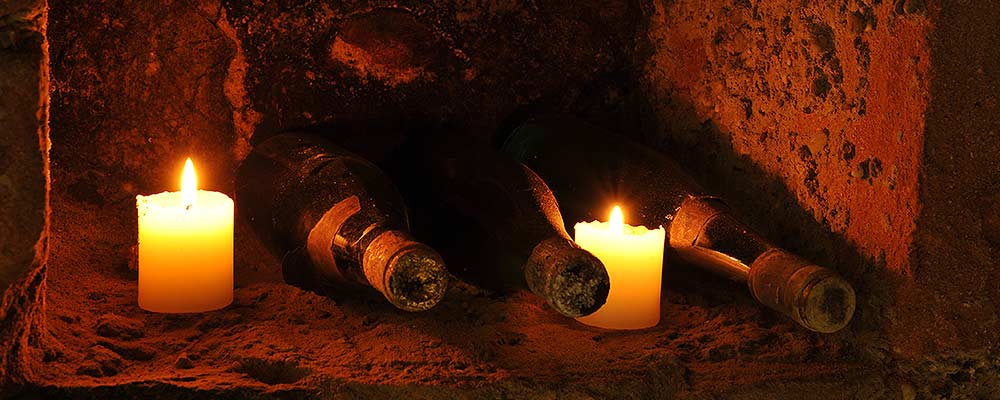







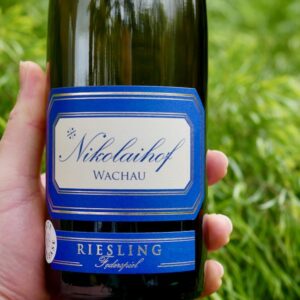
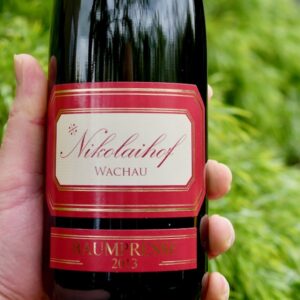
You must be logged in to post a comment.